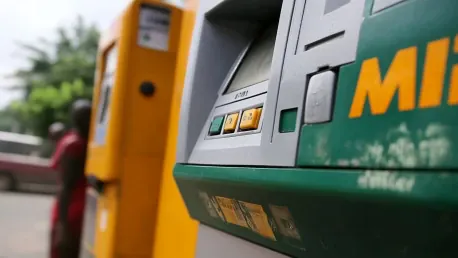The article “CBN’s New ATM Charges: A Step Backwards for Nigeria’s Financial Inclusion” by Elvis Eromosele discusses the recent policy changes by the Central Bank of Nigeria (CBN) regarding ATM withdrawal charges. The piece examines the implications of these changes on Nigeria’s financial inclusion efforts and the broader economic impact.
Policy Shift and Its Contradictions
From Digital Banking to Increased Fees
In recent years, the CBN has actively promoted digital banking and cashless transactions to enhance financial inclusion by encouraging financial institutions to expand their digital services. This move led many Nigerians to rely more heavily on ATMs, mobile transfers, and POS terminals, significantly reducing their physical visits to banking halls. Increased digital banking also aligned with the country’s priorities of fostering economic growth and better financial inclusion. However, the CBN’s new directive, effective March 1, 2025, imposes higher charges on ATM withdrawals and represents a notable policy shift. While customers using their bank’s ATMs won’t incur any fees, interbank withdrawals will now attract charges ranging from N100 per N20,000 at on-site ATMs to N500 at off-site ATMs. International withdrawals are subject to acquirer fees, and the previous practice of three free interbank withdrawals per month will cease. This substantial increase in charges contradicts the CBN’s earlier efforts to promote digital banking and reduce banking hall congestion.
Impact on Financial Inclusion Goals
The new charges could potentially force many Nigerians back into banking halls, essentially reversing the trend toward digital banking that was emphasized in recent years. These higher fees would undermine the very convenience that ATMs were designed to offer, likely deterring people from using digital banking services. If accessing one’s own money becomes more expensive, people might opt for physical banking transactions, negating the advantages of digital financial services.
Additionally, POS agents may raise their service fees to cope with the anticipated higher demand induced by increased ATM charges. This move further escalates the cost of transactions for everyday users and directly contradicts Nigeria’s commitment to achieving the Sustainable Development Goals (SDGs), especially those promoting sustained economic growth and inclusive financial services. This policy shift seems to hinder the nation’s efforts to build resilient infrastructure and foster financial innovation.
Economic Consequences and Public Burden
Timing and Economic Challenges
The timing of this policy change raises significant concerns, as Nigeria is grappling with various economic challenges, including persistent inflation, which already strains the financial capabilities of its citizens. The added financial burden from the new ATM charges will only worsen the economic hardships many Nigerians currently face. For a populace struggling with dwindling purchasing power, making basic financial transactions more expensive could lead to wider economic and social issues. Higher costs associated with accessing one’s own money could deepen financial exclusion, where a segment of the population may find themselves unable to afford even basic banking services. This exacerbates the economic strain on the masses and may lead to a reduction in savings, investments, and overall economic participation. The increased transaction fees could inadvertently widen the gap between different economic classes, contributing to broader socioeconomic disparities.
Necessity for Alternative Approaches
Instead of imposing new fees, the CBN should consider alternative approaches that genuinely enhance financial inclusion and support economic growth. Encouraging healthy competition among banks to expand ATM access, especially in remote or underserved areas, could mitigate the reliance on interbank withdrawals and boost overall efficiency. By making ATMs more accessible to a broader population, the financial system would become more inclusive and effective. Reinstating the provision of three free interbank withdrawals per month would significantly benefit ATM users without adding an undue financial burden. Further, there is a crucial need to strengthen the existing digital payment infrastructure. Addressing systemic issues like failed transactions, undue delays, and high mobile banking fees would go a long way in building trust and encouraging the adoption of digital financial services. A more robust, resilient digital payment system would vitalize Nigeria’s cashless economy ambitions.
Regulatory Measures and Stakeholder Engagement
Preventing Escalation of Service Fees
It is essential to implement further regulatory measures to prevent POS and mobile banking charges from escalating in response to the increased ATM costs. Without adequate regulation, POS operators might increase their fees, making financial services even more expensive and less accessible to the average Nigerian. This unchecked rise in transaction costs could potentially discourage the use of digital financial services and push individuals back toward traditional banking methods. Regulatory oversight is needed to prevent an unintended ripple effect throughout the financial ecosystem. Proper public awareness, coupled with robust stakeholder engagement, is critical before implementing significant policy changes such as these. Involving financial institutions, consumer advocacy groups, and the general public in the policymaking process ensures that new directives are better understood and received, reducing potential disruptions to economic activities. Open dialogue and transparency can lead to more informed and balanced policy decisions that address the needs and concerns of all stakeholders involved.
Advocacy for Reconsideration
In the article “CBN’s New ATM Charges: A Step Backwards for Nigeria’s Financial Inclusion,” Elvis Eromosele investigates the recent changes made by the Central Bank of Nigeria (CBN) concerning ATM withdrawal fees. Eromosele delves into how these adjustments might impact Nigeria’s ongoing efforts to boost financial inclusion and the broader economic consequences. The policy change could potentially reverse the progress made in encouraging more individuals to engage with formal banking systems. Increased ATM charges might deter people, particularly those with lower incomes, from using banking services, widening the gap between the banked and unbanked population. Furthermore, the article raises concerns about how this move may adversely affect Nigeria’s financial landscape by exacerbating economic inequality. The piece underscores the significance of accessible banking for economic growth and questions whether these new charges are a step in the right direction for Nigeria’s financial sector and overall economic health.









